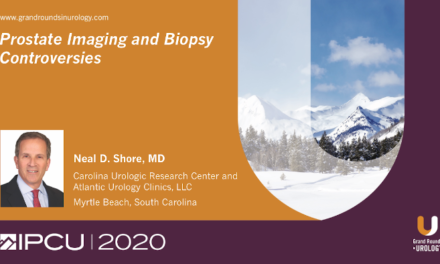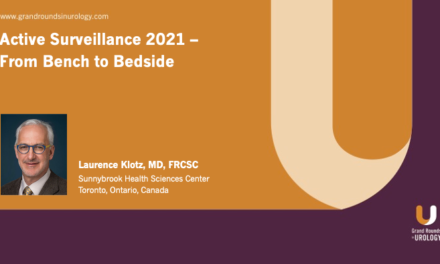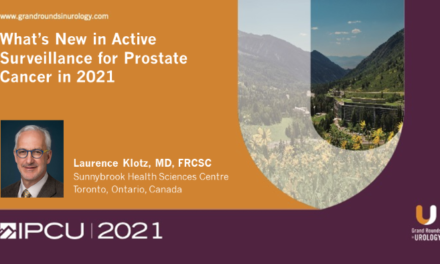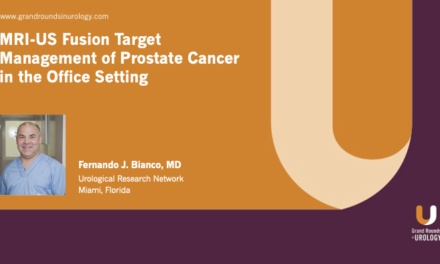Laurence Klotz, MD, FRCSC, presented “Active Surveillance 2021 – Patient Selection, Monitoring, and Innocuous Interventions” for the Grand Rounds in Urology audience in March 2021.
How to cite: Klotz, Laurence. “Active Surveillance 2021 – Patient Selection, Monitoring, and Innocuous Interventions” March 2021. Accessed Dec 2024. https://dev.grandroundsinurology.com/active-surveillance-2021-patient-selection-monitoring-and-innocuous-interventions/
Active Surveillance 2021 – Patient Selection, Monitoring, and Innocuous Interventions: Summary
In the third part of a Platinum Lecture trilogy on active surveillance, Laurence Klotz, MD, FRCSC, Professor of Surgery and holder of the Sunnybrook Chair of Prostate Cancer Research at the University of Toronto, discusses patient selection, monitoring, and innocuous interventions for active surveillance of prostate cancer.
He begins by summarizing the evidence against treating young men differently in terms of placing them on active surveillance or not. He explains that younger men have a lower risk of upgrading on active surveillance and a relatively greater risk of sexual side effects from treatment compared to older men. Dr. Klotz then considers whether active surveillance is safe in Black men, citing a study that found higher rates of progression in treatment and progression in Black patients compared to white patients, but no difference in metastasis or mortality, indicating that active surveillance is safe for this group. Dr. Klotz also looks at whether active surveillance is safe for patients with grade group 2 cancer, summarizing several studies which indicate that careful patient selection is pivotal in this group, but also that active surveillance can be a good option for some patients in this cohort. Dr. Klotz observes that biomarkers are helpful in patient selection here, and emphasizes the benefits of compliance with active surveillance biopsy protocols. Dr. Klotz continues his presentation with a discussion of innocuous interventions for patients on active surveillance. Regardless of whether these interventions actually prevent prostate cancer progression, these interventions, including smoking cessation, dietary modification, and regular exercise, can help patients feel proactive, and most of them have other health benefits. There is also some evidence that simple interventions like taking vitamin D, a low-dose statin, and metformin on a daily basis could reduce prostate cancer progression. Dr. Klotz concludes with a summary of all three parts of his lecture trilogy.
For more on active surveillance for prostate cancer, check out our collection page for the 2020 International Prostate Cancer Update!
ABOUT THE AUTHOR
Laurence Klotz, MD, is the former Chief of Urology at Sunnybrook Health Sciences Centre and former President of the Urological Research Society and the Canadian Urological Association. He currently serves as Professor of Surgery at the University of Toronto and holds the Sunnybrook Chair of Prostate Cancer Research. Dr. Klotz was the Founding Editor-in-Chief of both the Canadian Journal of Urology and the Canadian Urology Association Journal, and is now Editor Emeritus of the CUAJ. He is the Founder and Chairman of the Canadian Urology Research Consortium (CURC), and is also the Chair of the Global GU Oncology Group.
Dr. Klotz obtained his medical degree from the University of Toronto and completed his residency at the University of Toronto Gallie Program in Surgery. He was a fellow at Memorial Sloan Kettering Cancer Center in New York in uro-oncology.
Dr. Klotz is a widely published uro-oncologist with over 350 publications and several books. His main research interest has been prostate cancer. He has served on the boards of many medical/scientific organizations and journals, including the SUO, Prostate Cancer Canada, the journals Prostate Cancer and Prostatic Diseases, Brazilian Journal of Urology, Italian Journal of Urology, and World Journal of Urology.
Dr. Klotz was awarded the Queen’s Jubilee Medal for meritorious public service in 2012, and the University of Toronto Department of Surgery Lister Prize and the Society of Urologic Oncology Medal in 2013. He received the Harold Warwick Award from the Canadian Cancer Society for ‘outstanding contributions to cancer control’ in 2014. He received the Order of Canada in 2015, and the Richard Williams Award from the AUA in 2016. He received the Dean’s Lifetime Achievement Award from the University of Toronto in 2017.





